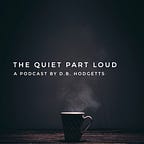Podcast Networks, Revenue & Growth
Three years ago I started a podcast called The Quiet Part Loud. It’s a funny thing starting a podcast; it used to be that you felt like an artist, someone that could inflict change through your words, your voice, your passion. Now, with over a million podcasts in production, it feels more like moving to L.A. to pursue a career in acting. Everyone is trying to be the next DiCaprio, or in our world, Joe Rogan when in reality they are more suited to local cable access television.
The intention of starting a podcast was simple. All my life, people have told me “You can’t say that here.”, “This isn’t the place for those topics.”, “Come on man, not now.” whenever I spoke my mind or brought up a subject that wasn’t the latest sports scores or gossip about someone. People acted like I was reciting the declaration of independence or saying something they couldn’t associate with. The tedium of trying to have a meaningful discussion about politics, science, culture and anything controversial became tiresome, but I believed in my heart these were subjects that others around the world wanted to discuss and wanted to hear about.
So, instead of continuing to force the issue in public, I bought a really cheap microphone (terrible idea), downloaded Audacity, and pressed record. You see I didn’t care about audio quality, production value or audience. The goal was to have my say, in the way I wanted to say it. It didn’t matter how many people were listening, how much money I could make; it was about having an unfiltered, uncensored voice.
Three years later and the “winners” of the podcast game, seem far removed from the vision I had of this medium. It’s potential impact and ability to affect change seem to have been overtaken by the same content we see on late night T.V. with the same personalities producing the same content in a different form.
Podcasts were, at least to me, supposed to allow unknown talent to be discovered. Talent that wasn’t curated through a Hollywood lens or through corporate branding. Podcasts were Pirate Radio, the place where you could explore without a mainstream filter on thought and opinion. Instead, the pirates have been hijacked by the biggest thieves; the ones that make the battleships.
Huge broadcasters, publishing groups and media conglomerates have stolen the game from the independents and with it, the chance for many to earn a living doing what they’re most passionate about. If podcasting revenue was a cake, independent shows would be left scrambling for the crumbs or forced to join a network that demanded control of their intellectual property for a chance to make a few bucks.
As podcasts become as voluminous as blogs, cutting through becomes ever more challenging. With marketing spends dictating who is seen and who is not, independent shows must rely on each other to help generate engagement; especially if they intend to stay independent. Cross promotional efforts must be something that all small shows strive for and concentrate on. We must resist the urge to reach a minimum threshold of monetisation required by these growing networks then handing over our IP or being thrown in to a carousel with large brands that overshadow our efforts.
If networks really care about surfacing independent content producers, they should develop a monetisation strategy that doesn’t require 5,000 downloads per week as many now have as the baseline for inclusion. The problem is, advertising only really works at scale, so these networks would have to truly want to support small shows and despite what they say, it’s simply not true.
Even the few “independent podcast networks” seem more interested in promoting services like editing and training than promotion and growth of the shows in their care. So, what is a podcaster to do? The term DIY comes to mind.
Do it yourself may seem daunting and a lot of work, but in the grand scheme of things; what have you got to lose?
What do we mean by DIY? It means networking with other podcasters in a similiar position to you. Collaborating on cross-promotion, appearing on each others shows and building a network yourself. What have you got to lose? What’s the worst thing that can happen? Connect through social media, offer your show as an amplifier and ask if the efforts can be reciprocated. If you can establish a network of 5–10 shows, you’re well on your way.
Inevitably, DIY networks if built and used correctly will slowly bring the indie podcasts into a bigger spotlight, which is the goal for many. More views, more downloads and more potentail revenue. Only then, once you’ve grown to a point where you plateau should you consider engaging with an established network. Big networks aren’t looking for you now because you offer no value to them, but once you do, ensure you’re getting a good deal that match your goals. You’ll always be treated according to the revenue you generate so ensure any arrangement aligns with your success.
The main thing? Just keep pressing record.
